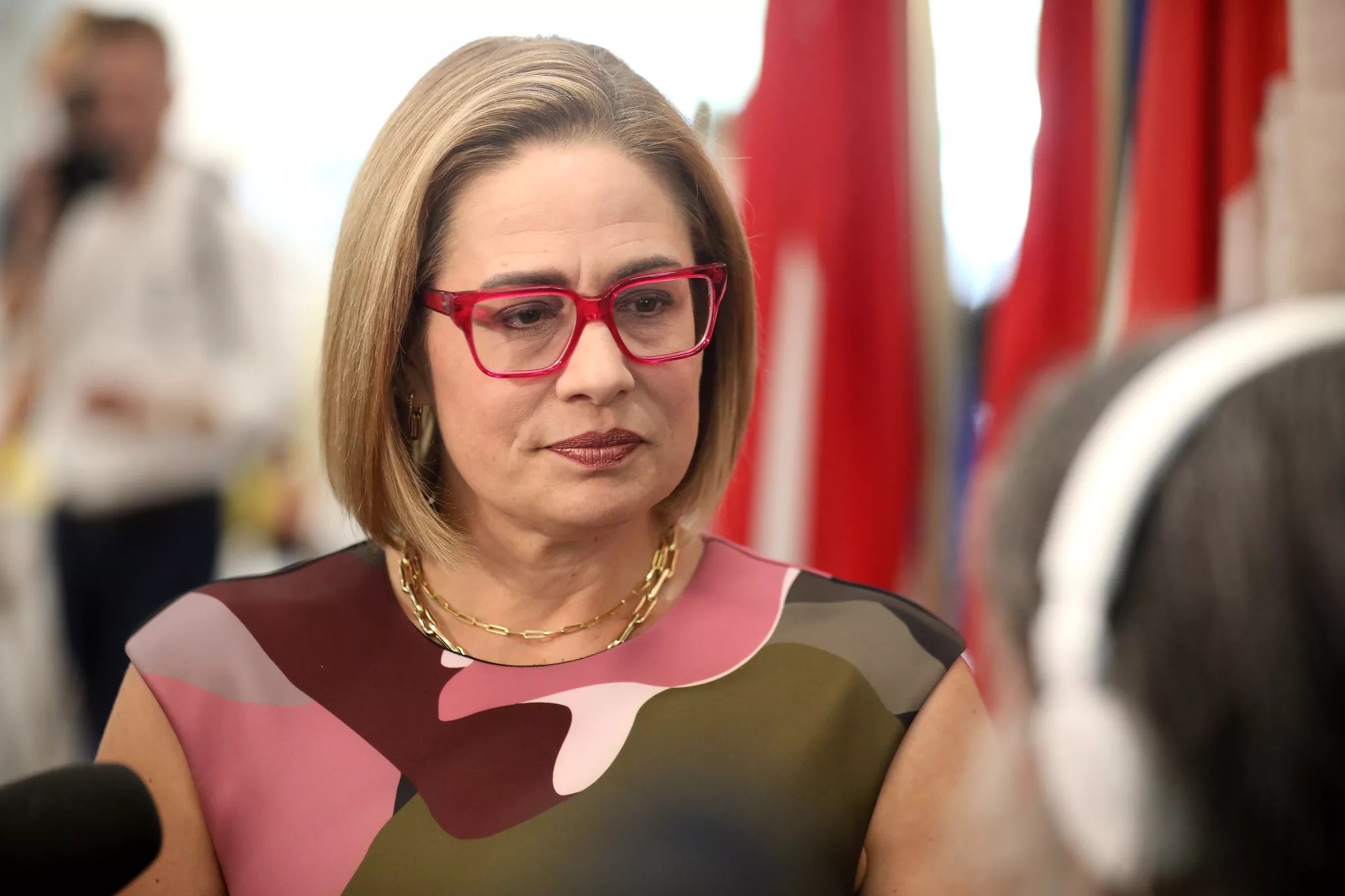
Gage Skidmore/Flickr/CC BY-SA 2.0

Audio By Carbonatix
Since leaving the Senate in January, Kyrsten Sinema has really gotten into psychedelic drugs.
In the spring, she lobbied lawmakers at the Arizona Legislature to put millions toward a certified clinical research study on ibogaine, a psychoactive alkaloid derived from the root of a West African shrub that has hallucinatory effects in high doses. Over the summer, she spoke at a psychedelic conference.
Sinema has cited a member of her security team, who used ibogaine to treat a traumatic brain injury, as the root of her advocacy. But in a national interview Tuesday with CNN’s Jake Tapper, Sinema revealed that she went to Mexico in May to try the drug herself.
“I knew nothing about psychedelic medicine – in fact, I was like, ‘Oh, drugs are bad, drugs are horrible, we should stay away,'” Sinema told Tapper, explaining her mindset before her former associate found success with the ibogaine. After the treatment, she said, he “looked totally different – like 10 years younger.”
Sinema noted that ibogaine has neuroregenerative properties and heals brain matter, making it a particularly helpful treatment for traumatic brain injuries and dementia. The former senator said it was her late grandmother’s battle with dementia, which runs in Sinema’s family, that motivated her to seek the treatment in Mexico, where the drug is legal.
“My number one fear is losing my brain power,” Sinema told Tapper. “The research shows that one treatment of Ibogaine reverses brain aging by 1.5 years. Just one. So, your brain actually gets younger and heals.”
In the United States, ibogaine is still a Schedule I substance – a classification from the Nixon-era War on Drugs that signifies a high potential for abuse and little accepted medical use. Other Schedule I substances include marijuana and many psychedelics, which have become far more mainstream in the past 10 years. The federal government is considering rescheduling marijuana, which would make it easier to research.
Tapper asked Sinema if she had spoken to officials in the Trump administration about rescheduling both marijuana and ibogaine.
“I think better than just asking for ibogaine to be rescheduled, the better, smarter move is to go through the clinical trial process to get it approved by the FDA,” Sinema responded. “Once a medicine is approved by the FDA, it automatically gets rescheduled.”
That’s true, though it’s worth noting that the drug product is approved and not the underlying substance.
AI and campaign funds
During her CNN appearance, Sinema also discussed her post-Senate work on developing artificial intelligence technologies. She also praised the Trump administration’s stances on AI.
“There are folks who have lots of various opinions about the Trump administration, but I gotta say: on AI, they are knocking it out of the park,” she told Tapper, referencing the White House’s AI action plan. “It is well-reasoned, it is well-thought, it is ambitious. It really strikes a path for us to win the AI race against China, which I think is of national security importance, but also, kind of an existential threat that we face as a country.”
Sinema helped launch the Spark Center for Innovation in Learning at Arizona State University, reportedly funding the initiative with $3 million from her campaign account. The center is run in partnership with OpenAI, which created the popular tool ChatGPT. Its purpose is to create new ways for neurodivergent people to learn using AI tools.
“So these are kids who are autistic, or have ADHD or dyslexic, and who maybe are falling through the cracks in the school system, or whose parents don’t know how to help them get to their full potential,” Sinema said, adding that the center will “develop tools that help them throughout the lifelong learning process” and help bring new companies to market.
Sinema has remained a prominent figure since leaving office, both because of her ibogaine advocacy and for less positive reasons. She has continued to spend campaign funds on ski trips and wineries since leaving the Senate, despite not running for office. Critics say she has violated campaign finance laws in the process.
In an interview with the Wall Street Journal last month, Sinema brushed off that criticism. “I don’t have anything to say about that,” she told the paper.
In the same interview, Sinema claimed credit for lessening the negative effects of Donald Trump’s “One Big Beautiful Bill,” the budget measure that cut Medicaid and slashed renewable energy incentives that will hit Arizona hard. The WSJ story referenced critics who claimed Sinema was overstating her role. It also quoted Arizona Senate Democratic minority leader Priya Sundareshan, who said seeing Sinema celebrate the Republican tax bill “makes me feel vindicated for having been disappointed in her when she was an elected Democrat.”
Phoenix New Times attempted to reach Sinema for comment but was not successful.